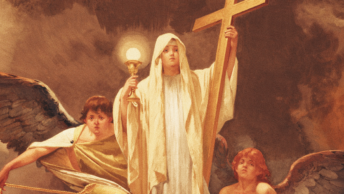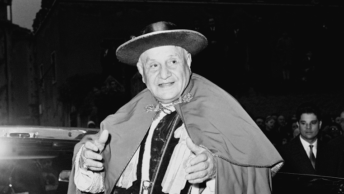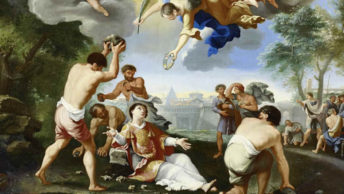Several years ago, I published an essay for my blog the Gospel Truth that contained my musings on life after death. It created some interesting feedback. My treatment of salvation caused the greatest concern. My main critic erroneously thought that I had stated that one could be saved even after death. I never said or wrote that anywhere, nor have I ever thought it.
I think I had said that I hoped everybody went to Heaven eventually…even Adolph Hitler. With very little difficulty, I can make a reasonable case for that based on the complexity of the human mind and all the factors, genetic and cultural that go into the formation of the individual conscience. According to the Catholic Church to think otherwise is to be guilty of the sin of presumption.
I will admit that there was one ambiguity that I needed to address. A Jesuit friend told me shortly after his ordination in 1969 as Catholics we had to only believe that there was a Hell but did not have to believe that anyone was there except the Fallen Angels. It’s a plausible statement but it did not clarify things well enough. What he should have said was that while we can hope that all men are saved, we have to allow for the distinct possibility that some or even many souls will not enter Heaven.
My understanding of salvation was seriously expanded after reading the late Fr. Hans Urs Von Balthasar’s marvelous book, Dare We Hope that All Men are Saved. The book jacket contends that his book was one of the most misunderstood works of Catholic theology in our times. His critics falsely accused him of being a universalist, which was considered a heresy well into the 20th century. Universalism holds with certainty that all men will be saved.
However, Von Balthasar did not actually say that. He allows for the possibility that many souls may be in Hell. But as Christians we should hope, and I would add, but also pray that all men will be saved. This is the full extent of loving one’s neighbor. In 1 Timothy 2:4 God wills that all men be saved. Can even the most sinful of men thwart the will of God and contradict Divine Providence? Isn’t it reasonable to think that Von Balthasar’s view just may be the case?
In the book’s Preface, Bishop Robert Barron quotes a vision of a Doctor of the Church, St. Catherine of Siena, who suffered an agony in her soul, to even think that one of God’s creatures would be damned for all eternity. She said she did not know how to reconcile even one of your creatures made in your image and likeness should be lost and slip from your hands.
There was an article in the Wanderer many years ago that told the story of a 13th or 14th century friar, who was so concerned with the salvation of all his fellow men that he reasoned that it was possible to believe that even in a suicide, at the precise second the rope tied on the bridge snapped his neck, God intervened and worked his divine mercy and saved the man’s soul.
The friar did not say it was certain, only that we can never know that it didn’t happen… especially if God is not just a judge but also one of infinite and unconditional mercy. That’s the view of God I choose to believe in. There is always hope…an underrated virtue if ever there was one.
At the focal point of this issue is that my aforementioned critic had both feet deeply implanted in the Church before Vatican II and I have only one foot planted there as I try to straddle the distance between the two different approaches to Catholic teachings. I think I am more of a reformed traditionalist because I like some things of the old way of thinking but have accepted some of the new ideas since 1963.
The Church before Vatican II had become one based on laws…dos and don’ts that had sacrificed some of the true virtues necessary for loving our neighbor. With regard to morality it was still beholden to an Augustinian Manichaeism that jaded its perception of sex and marriage. This Augustinian aura undoubtedly wounded millions of Catholics. I spent 32 years in a men’s Bible Study when I lived in St. Louis. I could often sense most of their uneasiness and resentment with the pre-Vatican church.
I had a priest threaten me with eternal damnation in the Confessional because I could not explain something I had done. I was just 11 years old. This particular priest was turned on by Almighty God and would shout those words from the pulpit every Sunday. Cotton Mather could not have done a better job of scaring or even scarring a congregation to death. Had I been proud like my paternal grandfather, I would have walked out of the confessional and the Church forever, as he did on some issue when he was 12 years old. But thanks to the grace of God, pride is not one of my major failings. When I told my spiritual adviser this story three years ago, he just shook his head in disbelief.
In St. Louis, I used to see dozens of other Catholics from the pre-Vatican II era…daily communicants that seem to have no joy or internal happiness (peace) that their religious devotion and abundance of grace is supposed to instill. They summarily judge other people and can be rude and even nasty to the small people around them. At a Home Owners Association meeting a while back, one of them snapped at me when I did not clearly understand what she had said to the group. She said loudly, what are you deaf? I said…Yeaaah! Her late husband had yelled at me in a Parish Council meeting because I questioned something about the Serra International Society for priestly vocations he ran in our parish
To me, their religious faith seems more liken to pride and arrogance than it does holiness. That’s what the Orthodoxy of the old Church has done to many. It seems devoid of charity and compassion for their fellow man. Yet not all is perfect. The new Church also has its serious faults, with some perversions of the Old Orthodoxy with its curious teachings on homosexuality, its remote emphasis on sin and salvation, abundant stress on the horizontal love of neighbor and the virtual elimination of the Latin Mass. To counter this, I have been trying my best to eliminate the negative from both Churches and stress the positive of each.
The old Church was a virtual dictatorship while the new one seems almost anarchistic at times. The first provided necessary structure and moral order while the other has added love, hope and mercy. While I laugh a lot and feel, not hot and fuzzy, but the warmth of having something special inside my soul, I enthusiastically try to pass these sentiments on to others through my humor, stories and genuine friendliness.
Nine years ago, one of my new acquaintances, a young waitress at Lester’s, my daily haunt for lunch, made my day when she told me I was the coolest guy she had met in her nine months on the job. Another time we started talking about Philosophy and Faith and she told me she was still searching…Aren’t most people just trying to get along?
As I have done for many people, I recommended Fulton J. Sheen’s Life is Worth Living to her. I said it was a better tip than the money I left. As I was leaving I also told her I would put her on my nice list. The people on this list are special people for whom I pray. One candle at a time—as the Christopher fathers used to say on TV. That is all any of us can hope for.
I truly believe we are all called to be messengers of grace and in today’s world that will not happen by preaching the Orthodoxy of the old Church— but only by extending the warm hand of friendship and hope so they can see the glow in our souls that points to an all-loving and an all-forgiving God.
I perceive many of these fervent feelings from my fellow parishioners in our new parish, St. Ann’s of Lasalette in Marietta, Georgia. If we all had their fervor and virtues, legions would make that connection and follow Jesus in an instant. Weren’t the early Christians known by the way that they love each other?
The Catholic Church is not one of just laws and judgments. It is the Church of love and mercy. But it is one pregnant with paradoxes and deep esoteric truths that most cannot fathom. God’s infinite mercy is irreconcilable with His absolute justice. It is the ultimate squared circle. We can’t understand it because it contradicts our human logic.
It is similar to the story I was told as a child about St. Augustine’s attempt to fully understand and explain the Triune God. He was wandering one of the beaches in North Africa when he encountered a young boy who was digging a hole and putting seawater in it. When asked what he was doing the lad responded that he was trying to put the sea into his hole. Augustine understood immediately the futility of his own search.
The last word is that we can never know exactly what happens at the precise moment just before one’s death. This is not ours to know with certitude but allows for the hope that God’s mercy will win over His justice. I am reminded of a story about a priest who quipped while I am alive, I am all for God’s Justice but when I die, I am all for His mercy. I wish I could have thought of that!








